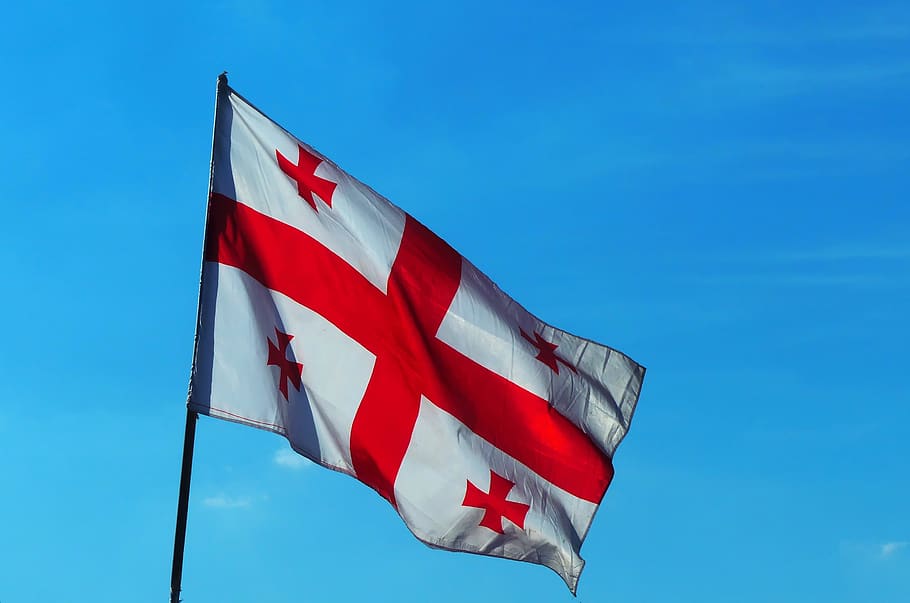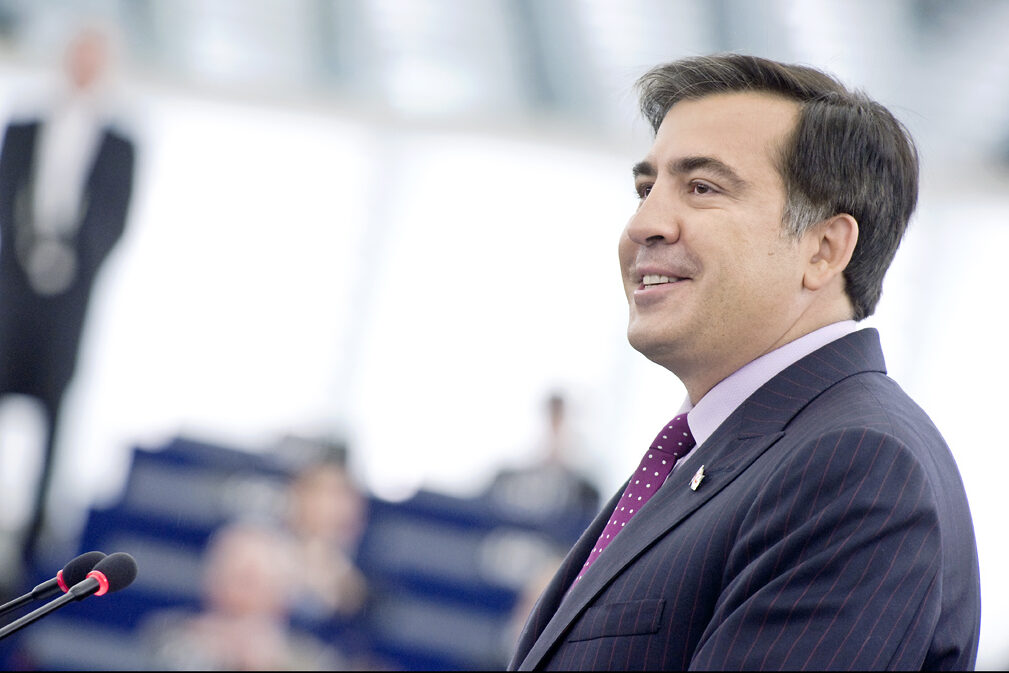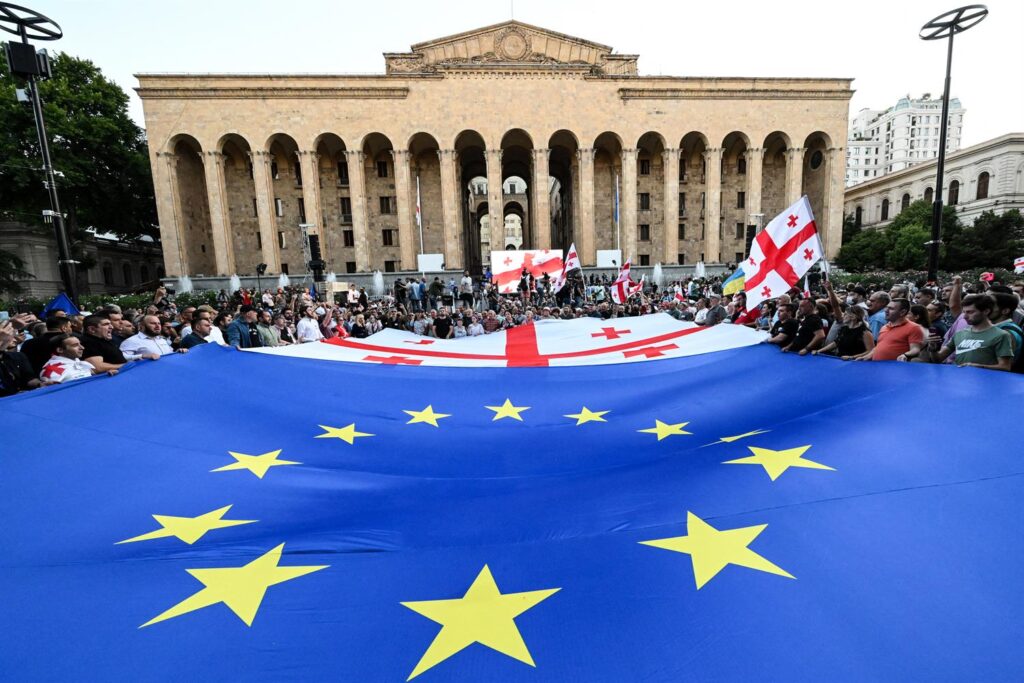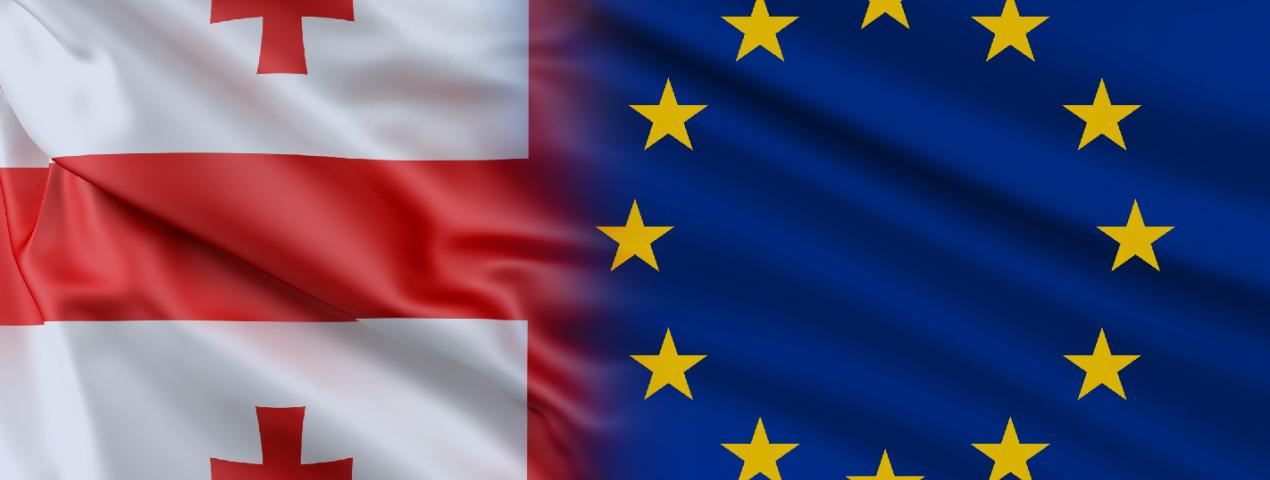Georgia’s pursuit of closer ties with the European Union (EU) and NATO has been marked by significant milestones, challenges, and personalities. The Rose Revolution in 2003 brought Mikheil Saakashvili to power with a commitment to integrate Georgia into the EU and NATO. This article traces the evolution of Georgia’s European aspirations, its reform progress, and the influence of external factors, including the Russian invasion of 2008 and the subsequent impact on Georgia’s democracy. Additionally, it delves into Saakashvili’s role in Georgia’s journey and the population’s increasingly pro-Ukraine and pro-EU stance amid Russia’s actions in the region.

The Rose Revolution and European Aspirations (2003-2008)
Mikheil Saakashvili’s rise to power in 2003 marked a turning point in Georgia’s foreign policy, with a clear commitment to integrate the country into the EU and NATO. The Georgian government embarked on ambitious reform agendas, leading to economic growth and improved human rights records. During this period, Georgia’s alignment with European values and institutions grew stronger, setting the stage for deeper cooperation.
The Russo-Georgian War and Membership Perspectives (2008)
In 2008, the Russo-Georgian War erupted when Russian forces invaded Georgia, challenging the country’s sovereignty and territorial integrity. This conflict further underscored Georgia’s desire to seek refuge in European institutions. The war made the membership perspectives for Georgia in the EU and NATO more pronounced, as the country’s security concerns and aspirations for Euro-Atlantic integration intensified.

Authoritarian Shift and External Influence (2008-Present)
Following the Russo-Georgian War, Georgia witnessed a shift towards authoritarianism, both during the latter years of Saakashvili’s presidency and under his successors. Russia exerted increasing influence over Georgian politics, polarizing political debate and complicating the path towards democratic governance. This period posed challenges to Georgia’s EU and NATO aspirations as the country’s commitment to European values came under scrutiny.
The Impact of Mikheil Saakashvili on Georgia’s Membership Prospects
Mikheil Saakashvili’s personality played a significant role in Georgia’s membership prospects in the EU and NATO. Following his departure as president in 2013, Saakashvili’s role became estranged, leading to his exile to Ukraine and subsequent arrest upon his return to Georgia. This development added complexity to Georgia’s political landscape, with the EU and NATO closely monitoring the situation and its implications for the country’s European future.
Russian Invasion of Ukraine and Pro-Ukraine, Pro-EU Sentiment (2022)
The Russian invasion of Ukraine in February 2022 created considerable anxiety among the Georgian population. Despite challenges and external pressures, most surveys indicate a strong pro-Ukraine and pro-EU sentiment among Georgians. This sentiment reflects Georgia’s commitment to its European aspirations and highlights the country’s desire for closer integration with the EU and NATO.

Prospects for Georgia’s EU Membership [bigger]
Georgia’s journey towards European Union (EU) membership is marked by a myriad of challenges, including Russia’s invasion of Ukraine, internal political complexities, and the delicate balance between pro-EU sentiments and creeping authoritarianism. As the country faces these multifaceted issues, the prospects for future EU membership are influenced by its commitment to democratic values, the impact of external pressures, and the population’s unwavering desire for closer integration with the EU.
Russia’s Invasion of Ukraine and Security Concerns
Russia’s invasion of Ukraine in 2014 heightened security concerns for Georgia and the broader region. The occupation of Crimea and the ongoing conflict in Eastern Ukraine underscored the importance of EU and NATO membership as a means of ensuring stability and sovereignty. However, the unresolved conflicts in Abkhazia and South Ossetia complicate Georgia’s path towards EU accession, as territorial integrity remains a significant issue.
Ongoing Political Difficulties and Authoritarian Tendencies
Georgia’s political landscape has been marked by political polarisation and tensions between ruling parties and the opposition. Recent events, such as the proposed ‘foreign agents’ law’ and the arrest of opposition figures, have raised concerns about democratic governance and adherence to European values. The persistence of authoritarian tendencies poses challenges to Georgia’s EU membership prospects, as the EU emphasizes the importance of democratic principles in the accession process.

Geopolitical Challenges and Regional Dynamics
Georgia’s proximity to Russia and its historical ties to the post-Soviet space create geopolitical complexities. Russia’s influence over Georgian politics and its efforts to exert control over the country pose significant challenges to Georgia’s Euro-Atlantic aspirations. Striking a delicate balance between maintaining regional stability and pursuing European integration is crucial for Georgia’s future prospects within the EU.
Pro-EU Population and Public Sentiment
Despite the challenges and internal political difficulties, Georgia’s population remains overwhelmingly pro-EU and pro-Ukraine. The desire for closer integration with the EU is deeply rooted, reflecting the people’s aspirations for democracy, prosperity, and a European future. This sentiment serves as a strong driving force towards EU membership and highlights the importance of aligning domestic policies with European values.
Democratic norms
While Georgia was officially granted EU candidate status in May 2022, there are several EU factors which are likely to severely hamper progress towards Georgian membership. The ongoing political difficulties and concerns over democratic backsliding in Georgia have raised doubts about the country’s readiness to fully embrace European values and principles. The recent proposed ‘foreign agents’ law and the arrest of opposition figures have highlighted challenges to media freedom and political pluralism, undermining Georgia’s progress towards a robust democratic system.
Geopolitical position
Meanwhile, Georgia’s unresolved conflicts with Abkhazia and South Ossetia, as well as its delicate geopolitical position in the post-Soviet space, present significant challenges for the EU, even after the Ukraine War. The presence of Russian military forces and the territorial integrity issues greatly complicate Georgia’s path towards EU membership. Given the current tensions between the EU and Russia, admitting Georgia as a member could potentially escalate regional tensions and lead to further complications. The EU knows it must carefully consider the implications of admitting a country with unresolved conflicts and Russia’s influence in its neighborhood, weighing the potential risks and impacts on the EU’s overall stability and security.
In sum
The journey towards EU membership for Georgia is a complex and multi-faceted process, influenced by a range of internal and external factors. While the country has demonstrated its commitment to European values and integration, challenges such as political difficulties, geopolitical complexities, and concerns over democratic backsliding have slowed progress. The EU must carefully assess Georgia’s adherence to democratic principles and the resolution of territorial conflicts before fully embracing the country as a member.
Additionally, the delicate geopolitical dynamics between Russia and the EU require cautious navigation to ensure stability in the region. Despite these challenges, Georgia’s unwavering pro-EU sentiment reflects its genuine desire for closer integration, presenting an opportunity for the country to continue on its path towards a prosperous and democratic future within the European family. The EU’s support and engagement with Georgia remain crucial in navigating these complexities and working towards a more integrated and stable European neighborhood.

